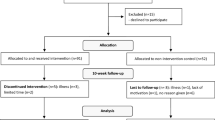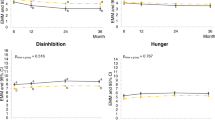Abstract
OBJECTIVE:
To investigate the effects of chronic stress on weight changes and related behavioral changes in parents with a child who had just been diagnosed with cancer compared to parents with healthy children.
DESIGN:
Longitudinal case–control study with assessments occurring over a three-month period following the child's diagnosis of cancer.
SUBJECTS:
In total, 49 parents of healthy children and 49 parents of cancer patients aged 19–58 y.
MEASUREMENTS:
Body weight, diet, physical activity, self-reported mood and stress.
RESULTS:
Parents of cancer patients were more likely to gain weight, and experienced significantly greater weight gain over the 3 months than parents of healthy children. The magnitude of weight gain was related to the degree of psychological distress that the parents experienced. Parents of cancer patients reported lower levels of physical activity and lower caloric intake than parents of healthy children, with the most marked differences between groups occurring in the area of physical activity.
CONCLUSION:
Findings suggest that a major stressor, such as a child's diagnosis of cancer, is associated with weight gain. Further research is needed to determine how long these weight gains persist and whether other types of stress also produce weight gains. Such studies should focus not only on the effect of stress on eating behavior but also on physical activity.
This is a preview of subscription content, access via your institution
Access options
Subscribe to this journal
Receive 12 print issues and online access
$259.00 per year
only $21.58 per issue
Buy this article
- Purchase on Springer Link
- Instant access to full article PDF
Prices may be subject to local taxes which are calculated during checkout


Similar content being viewed by others
References
Greeno CG, Wing RR . Stress-induced eating. Psychol Bull. 1994; 115: 444–464.
Lattimore PJ . Stress-induced eating: an alternative method for inducing ego-threatening stress. Appetite 2001; 36: 187–188.
Epel E, Lapidus R, McEwen B, Brownell K . Stress may add bite to appetite in women: a laboratory study of stress-induced cortisol and eating behavior. Psychoneuroendocrinology 2001; 26: 37–49.
Rutledge T, Linden W . To eat or not to eat: affective and physiological mechanisms in the stress-eating relationship. J Behav Med 1998; 21: 221–240.
Herman CP, Polivy J, Lank CN, Heatherton TF . Anxiety, hunger, and eating behavior. J Abnorm Psychol 1987; 96: 264–269.
Laitinen J, Ek E, Sovio U . Stress-related eating and drinking behavior and body mass index and predictors of this behavior. Prev Med 2002; 34: 29–239.
Ng DM, Jeffery RW . Relationships between perceived stress and health behaviors in a sample of working adults. Health Psychol 2003; 22: 638–642.
Rosmond R, Dallman MF, Björntorp P . Stress-related cortisol secretion in men: relationships with abdominal obesity and endocrine, metabolic and hemodynamic abnormalities. J Clin Endocr Metab 1998; 83: 1853–1859.
Korkeila M, Kaprio J, Rissanen A, Koshenvuo M, Sorensen TI . Predictors of major weight gain in adult Finns: stress, life satisfaction and personality traits. Int J Obes Relat Metab Disord 1998; 22: 949–957.
Fredman L, Daly MP . Weight change: an indicator of caregiver stress. J Aging Health 1997; 9: 43–69.
Vitaliano PP, Russo J, Scanlan JM, Greeno CG . Weight changes in caregivers of Alzheimer's care recipients: psychobehavioral predictors. Psychol Aging 1996; 11: 155–163.
Dahlquist LM, Czyzewski DI, Jones CL . Parents of children with cancer: a longitudinal study of emotional distress, coping style, and marital adjustment two and twenty months after diagnosis. J Pediatr Psychol 1996; 21: 541–554.
Grootenhuis MA, Last BF . Adjustment and coping by parents of children with cancer: a review of the literature. Support Care Cancer 1997; 5: 466–484.
Hoekstra-Weebers JE, Jaspers JP, Kamps WA, Klip, EC . Risk factors for psychological maladjustment of parents of children with cancer. J Am Acad Child Adolesc Psychiatry 1999; 38: 1526–1535.
Sawyer MG, Antoniou G, Toogood I, Rice M, Baghurst PA . A prospective study of the psychological adjustment of parents and families of children with cancer. J Paediatr Child Health 1993; 29: 352–356.
Sawyer MG, Streiner DL, Antoniou G, Toogood I, Rice M . Influence of parental and family adjustment on the later psychological adjustment of children treated for cancer. J Am Acad Child Adolesc Psychiatry 1998; 37: 815–822.
Speechly KN, Noh S . Surviving childhood cancer, social support, and parents' psychological adjustment. J Pediatr Psychol 1992; 17: 15–31.
Buzzard IM, Faucett CL, Jeffery RW, McBane L, McGovern P, Baxter JS, Shapiro AC, Blackburn GL, Chlebowski RT, Elashoff RM, Wynder EL . Monitoring dietary change in a low-fat intervention study: advantages of using 24-hour dietary recalls vs. food records. J Am Diet Assoc 1996; 96: 574–579.
Stunkard AJ, Messick S . The three-factor eating questionnaire to measure dietary restraint, disinhibition, and hunger. J Psychosom Res 1985; 29: 71–83.
Paffenbarger RS, Wing AL, Hyde RT . Physical activity as an index of heart attack risk in college alumni. Am J Epidemiol 1978; 108: 161–175.
Wing RR, Epstein LH, Patternostro-Bayles M, Kriska A, Nowalk MP, Gooding W . Exercise in a behavioral weight control programme for obese patients with Type 2 (non-insulin-dependent) diabetes. Diabetologia 1988; 31: 902–909.
Harris JK, French SA, Jeffery RW, McGovern PG, Wing RR . Dietary and physical activity correlates of long-term weight loss. Obes Res 1994; 2: 307–313.
Cohen S, Kamarck T, Mermelstein R . A global measure of perceived stress. J Health Soc Behav 1983; 24: 385–396.
Rahe RH . Epidemiological studies of life changes and illness. Int J Psychiatry Med 1975; 6: 131–146.
McNair PM, Lorr M, Droppleman LF . POMS manual, 2nd edn. San Diego; Educational and Industrial Testing Service; 1981.
Cassileth BR, Lusk EJ, Brown LL, Cross PA . Psychosocial status of cancer patients and next of kin: normative data from the Profile of Mood States. J Psychol Oncol 1985; 3: 99–105.
Lichtman SW, Pisarska K, Berman ER, Pestone M, Dowling H, Offenbacher E, Weisel H, Heshka S, Matthews DE, Heymsfield SB . Discrepancy between self-reported and actual caloric intake and exercise in obese subjects. N Engl J Med 1992; 327: 1893–1898.
Haukkala A, Uutela A, Salomaa V . Depressive symptoms, cynical hostility, and weight change: a 3-year follow-up among middle aged men and women. Int J Behav Med 2001; 8: 116–133.
American Psychiatric Association. Diagnostic and statistical manual of mental disorders, 4th edn. American Psychiatric Association: Washington, DC; 1994.
Barefoot JC, Heitmann BL, Helms MJ, Williams RB, Surwit RS, Siegler I . Symptoms of depression and changes in body weight from adolescents to mid-life. Int J Obes Relat Metab Disord 1998; 22: 688–694.
DiPietro L, Anda RF, Williamson DF, Stunkard AJ . Depressive symptoms and weight change in a national cohort of adults. Int J Obes Relat Metab Disord 1992; 16: 745–753.
Godart NT, Flament MF, Perdereau F, Jeammet P . Comorbidity between eating disorders and anxiety disorders: a review. Int J Eat Disord 2002; 32: 253–270.
U.S.D.H.H.S.. Physical activity and health: a report of the Surgeon General, US Department of Health and Human Services, Centers for Disease Control and Prevention, National Center for Chronic Disease Prevention and Health Promotion, Atlanta, GA, 1996.
Author information
Authors and Affiliations
Corresponding author
Rights and permissions
About this article
Cite this article
Smith, A., Baum, A. & Wing, R. Stress and weight gain in parents of cancer patients. Int J Obes 29, 244–250 (2005). https://doi.org/10.1038/sj.ijo.0802835
Received:
Revised:
Accepted:
Published:
Issue Date:
DOI: https://doi.org/10.1038/sj.ijo.0802835
Keywords
This article is cited by
-
Cognitive Behavioral Stress Management for Healthy Women at Risk for Breast Cancer: a Novel Application of a Proven Intervention
Annals of Behavioral Medicine (2015)
-
The Effects of Stress on Physical Activity and Exercise
Sports Medicine (2014)
-
Associations between psychological stress, eating, physical activity, sedentary behaviours and body weight among women: a longitudinal study
BMC Public Health (2013)
-
Do life-events that obese inpatients think happened to them soon before their subjective problematic weight gain have an effect on their current psychopathology over and beyond BMI and binge eating?
Eating and Weight Disorders - Studies on Anorexia, Bulimia and Obesity (2013)
-
Stress and Adiposity: A Meta‐Analysis of Longitudinal Studies
Obesity (2011)



